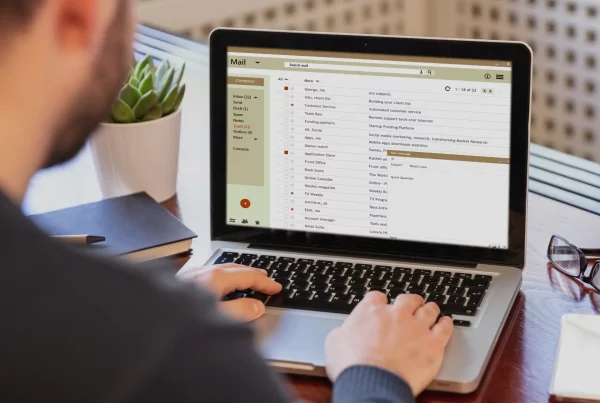Updated: 06 November 2023 • 9 minutes Read
Creating an email address is not a decision to be taken lightly. The email address you choose will become a digital identity you’ll carry for years, if not decades. Therefore, making a well-informed decision is crucial to avoid future regrets.
Selecting the perfect email address can be a challenge, as it greatly depends on your specific use case. Whether for personal communication with family and friends or professional correspondence in a business context, the choice becomes even more critical.
In this comprehensive article, we will provide you with tips and guidelines on how to select the ideal email address tailored to different scenarios. Whether you are creating a personal or a business email, our insights will serve as a reference to assist you in this important decision-making process.
Let’s dive into the world of email addresses and ensure you make the right choice that will serve you well in the years to come.
 Points to consider when choosing addresses for different purposes
Points to consider when choosing addresses for different purposes
Some points to remember when deciding on an email address for each purpose.
When using email for business purposes, it’s essential to create an email address that you wouldn’t be embarrassed to show to clients and business partners. Essentially, you should avoid incorporating playful elements as you would with a personal email address.
The most common approach for business email addresses is using personal or company names. The goal is to create an email address that conveys what it represents to the recipient.
|
Example: ● Personal Name [john@yourdomain.com] ● Business Name [johncafe@yourdomain.com] |
This professional approach ensures that the purpose and identity of the email address are immediately apparent to others.
If you are a freelancer, it can be beneficial to include your profession or speciality in the email address; this helps recipients easily form an image of “who you are” and what you specialise in.
|
Example: ● john.writer@yourdomain.com ● john.illustrator@yourdomain.com |
By including your profession or speciality in the email address, you make it clear to potential clients or collaborators what you do and what services you offer, which can enhance your professional image and branding as a freelancer.
If the desired account name is already in use, you can consider including numbers, such as an employee ID, in the email address to make it unique.
|
Example: ● john.123@yourdomain.com |
By adding numbers to your email address, you can differentiate it from others with the same or similar names, ensuring that your email address is still available and reflects your identity.
When adding numbers to your email address, it’s a good idea to keep them as short and easy to remember as possible; this ensures that recipients won’t find it too cumbersome to recall your email address.
Sometimes, you might want to incorporate playful elements into your business email address for reasons related to your work or interests. For example, using an address like “playgolfeveryweek@yourdomain.com” could make it more memorable to golf enthusiasts among your business contacts.
However, it’s important to be aware that incorporating playful elements into your business email address may also risk making others think you’re using your personal email for work. When considering adding playful elements to your business email, it’s essential to do so cautiously and consider the potential perceptions of your business associates.
When it comes to personal email addresses, there are no restrictions similar to those for business or job application purposes. You have the freedom to choose what works best for you and something that you won’t easily get tired of.
You can use a simple pattern similar to your work email using your name. Since it’s your name, it’s something you won’t easily tire of.
|
Example: ● johnlewis@yourdomain.com |
This approach keeps your personal email address clean and straightforward, making it easy to remember and use.
For personal use, you have the freedom to choose as you like. Since you’ll be using it for a long time, it’s essential to create an email address that you won’t regret three or five years down the line. The key is to make a choice that suits your personal preferences and needs, ensuring that it remains a convenient and enjoyable email address to use over the years.
Points to note when creating an email address:
Some common considerations apply regardless of the usage scenario. In this section, we’ll introduce the main points to remember:
-
Restricted Characters
There are limitations on the characters that can be used in email addresses. Generally, email addresses can consist of alphanumeric characters (uppercase and lowercase) and some specific symbols. Additionally, the availability of symbols may vary depending on the email service provider.Commonly allowed symbols include:
- “-” (hyphen)
- “_” (underscore)
- “.” (period)
If you wish to use specific symbols, it’s advisable to check the service’s character restrictions before signing up. Some services may have limitations, like allowing only the use of hyphens. By adhering to these character restrictions, you can ensure your email address is compatible with various email services and will function as expected.
-
Keep it simple
It’s advisable to create an email address that is as clear and easy to type as possible. Excessive length or the overuse of symbols can make your email address hard to remember, even for you. Moreover, when sending emails, having a lengthy email address can be cumbersome to type, and there’s a higher risk of making typing mistakes, which could result in emails not reaching their intended recipients.
To avoid such inconveniences, aim to create an email address that is user-friendly and easy to type. An easily understandable email address not only benefits you but also leaves a positive impression, especially in professional contexts like business.
-
Made to continue to use it for decades
It’s important to be conscious of the fact that you’ll likely use your email address for a long time, and in some cases, throughout your lifetime. Therefore, it’s crucial to make this decision carefully to avoid any regrets.
Additionally, creating an eccentric email address based on your current mood or whims can also be risky. Later on, when you look back at it with a cooler head, you might be more likely to regret the choice. Therefore, when creating an email address, consider its longevity and whether it will stand the test of time.
Can you create an address that makes it difficult for spam emails to arrive?
Many people find their inboxes inundated with unwanted spam emails, which can be annoying. It’s natural to want to minimise these disruptive spam emails in your inbox. While it’s challenging to block all spam completely, there are measures you can take to reduce their frequency.
Let’s explore some practical steps you can take to combat spam!
Make your email address at least 10 characters long to reduce the chances of receiving spam. Many spam email senders use a brute force approach, combining short words and sending emails randomly, hoping that some will hit the target.
It’s essential to strike a balance between length and simplicity. The longer the email address, the less straightforward and memorable it becomes. You’ll need to decide whether you prioritise the clarity and simplicity of the email address or spam prevention when making this choice.
Note: It’s essential to prioritise your privacy and security. Avoid incorporating personal information like your phone number or date of birth into your email address. Including such details in your email could expose your personal information, making it easier for others to discover sensitive data through your email address.
Summary
In conclusion, the choice of an email address should align with the specific usage scenario. For business or job-related purposes, it’s generally best to avoid playful elements and instead use your name or company name to clarify “who it belongs to.”
Conversely, for personal use, you have more freedom to incorporate elements that have sentimental value, like your child’s name or your hobbies.
If you’re determined to minimise the reception of spam emails, avoiding short and straightforward email addresses is a good approach. Using a combination of English letters, numbers, and symbols and making it at least 10 characters long can be an effective strategy to deter spammers. Balancing the security of your email address and its memorability is essential.
Ultimately, the right email address for you will depend on your preferences, needs, and the level of security or simplicity you require for different purposes.
Topics: Email
Don’t forget to share this post!


